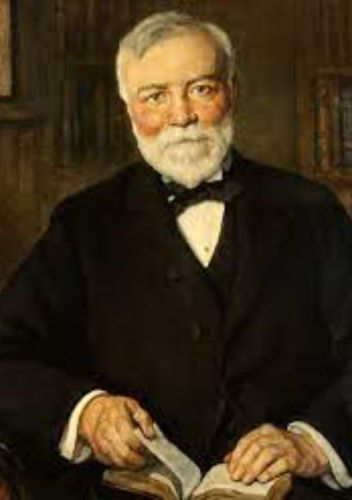What is Andrew Carnegie’s Net Worth in 2024?
Andrew Carnegie, the renowned industrialist and philanthropist, amassed a colossal fortune during his lifetime. However, as of 2024, Andrew Carnegie’s net worth is difficult to ascertain accurately due to his passing in 1919. Nevertheless, it is estimated that at the time of his death, Carnegie’s net worth was around $350 million. Adjusting for inflation, this staggering amount would equate to approximately $5.5 billion in today’s currency.
Unfortunately, Andrew Carnegie died on August 11, 1919 at the age of 83. In August 1919, the cause of death was revealed as Pneumonia.
Early life of Andrew Carnegie
Andrew Carnegie was born on November 25, 1835, in Dunfermline, Scotland. At the age of 13, he immigrated to the United States with his family, seeking better opportunities. Settling in Pittsburgh, Pennsylvania, the young Carnegie worked in a cotton factory before securing a position as a bobbin boy in a textile mill. Despite limited formal education, Carnegie eagerly pursued self-improvement through reading and self-study.
Career

Carnegie’s career took off when he entered the telegraph industry, initially working as a messenger boy and gradually rising through the ranks. He later became a superintendent for the Pennsylvania Railroad, where he honed his business acumen and established valuable connections. In 1870, he co-founded the Keystone Bridge Company, which marked the beginning of his success in the steel industry. Carnegie’s ventures expanded, culminating in the establishment of Carnegie Steel Company, which became one of the most significant players in the American steel industry.
Personal life and character
While Carnegie was driven by business pursuits, he also had a fulfilling personal life. He married Louise Whitfield in 1887, and they had one daughter named Margaret. Despite his vast wealth, Carnegie maintained a relatively modest lifestyle and was known for his frugality. He believed in the responsibility of the wealthy to use their fortunes to benefit society, a philosophy that would shape his future philanthropic endeavors.
Reputation
Andrew Carnegie’s reputation in his time was a mix of admiration and criticism. On one hand, his entrepreneurial spirit and remarkable success in the steel industry earned him immense respect. However, his business practices were not without controversy, including clashes with labor unions and accusations of monopolistic behavior. Carnegie’s reputation also benefitted from his significant philanthropic contributions, which endeared him to many as a benevolent and visionary figure.
Awards and Honors
Andrew Carnegie received numerous awards and honors throughout his life. In 1881, he was awarded the prestigious Legion of Honor by the French government for his services to education and philanthropy. Carnegie also became a member of the British Order of Merit, a rare distinction for a non-British citizen. Furthermore, he was the recipient of honorary degrees from several universities, recognizing his contributions to the fields of industry and philanthropy.
How has Andrew Carnegie spent his wealth?
Andrew Carnegie’s philanthropy became his enduring legacy. After retiring from business in 1901, he dedicated himself to giving away the majority of his fortune. Carnegie’s most notable philanthropic endeavor was the establishment of libraries across the United States, totaling over 2,500 libraries in total. He believed that access to education and knowledge was essential for societal progress. Additionally, Carnegie funded various educational institutions, including the Carnegie Institute of Technology (now Carnegie Mellon University) and the Carnegie Endowment for International Peace.
Did Andrew Carnegie have any crypto investments? And if so, what are they?
Given that Andrew Carnegie passed away in 1919, long before the advent of cryptocurrencies, it is highly unlikely that he had any crypto investments. Cryptocurrencies, such as Bitcoin, emerged in 2009, nearly a century after Carnegie’s passing. Therefore, it is safe to assume that he did not participate in this form of investment during his lifetime.
Frequently Asked Questions
What were Andrew Carnegie’s major contributions to philanthropy?
Andrew Carnegie’s major contributions to philanthropy include the establishment of thousands of libraries, funding educational institutions, and supporting causes related to world peace.
How did Andrew Carnegie acquire his wealth?
Carnegie acquired his wealth through his ventures in the steel industry, particularly with the establishment of Carnegie Steel Company.
Was Andrew Carnegie a philanthropist throughout his life?
While Carnegie became a dedicated philanthropist later in his life, he also engaged in business pursuits and wealth accumulation during his earlier career.
How did Andrew Carnegie view wealth and its distribution?
Carnegie believed that the wealthy had a moral obligation to distribute their fortunes for the greater good of society. He advocated for the concept of “the gospel of wealth,” where surplus wealth should be reinvested in the community.
What is the significance of Carnegie’s libraries today?
Carnegie’s libraries continue to play a vital role in communities worldwide, providing access to knowledge, promoting literacy, and serving as cultural and educational hubs.
Summary
Andrew Carnegie, a prominent figure in American history, accumulated a vast fortune through his ventures in the steel industry. Despite his passing in 1919, his net worth at the time of his death was estimated to be around $350 million, equivalent to approximately $5.5 billion today. Carnegie’s humble beginnings, remarkable career, and philanthropic legacy continue to inspire generations. His contributions to education and society, particularly through the establishment of libraries, have left an indelible mark on the world. While Carnegie’s reputation may have been subject to both admiration and criticism during his lifetime, his dedication to giving back has secured his place as one of history’s most influential philanthropists.
CryptoGlobally aims to offer impartial and trustworthy data on cryptocurrency, finance, trading, and shares. Yet, we can't give financial guidance and encourage individuals to conduct their own studies and thorough checks.